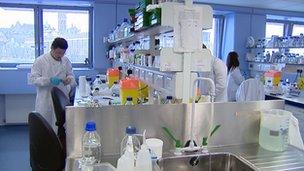New £30m Scots innovation centres to create 2,000 jobs
- Published

The Stratified Medicine Innovation Centre will support medical research
More than 2,000 new jobs could be created over the next five years at three technology innovation centres in Glasgow and Edinburgh.
Glasgow University is being given a total of £18m by the Scottish Funding Council to develop two of the centres.
One will focus on electronic sensor and imaging systems. The other will aim to pioneer medical research projects.
A Digital Health Institute will also be created in Edinburgh to address demands on health and social care services.
The Scottish Funding Council (SFC) has pledged £10m over the next five years to support the Innovation Centre - Sensor and Imaging Systems (IC-SIS) at Glasgow University.
Stratified medicine
It is hoped the facility will support collaborative projects with industry and deliver new products to market.
Estimates suggest that the initial £10m investment could generate up to £596m for the Scottish economy.
The centre will be supported by 11 other Scottish universities and 22 industry partners.
The SFC is also providing £8m of funding to Glasgow University over five years to back the creation of the £20m Stratified Medicine Scotland Innovation Centre (SMS-IC).
Stratified medicine involves examining the genetic make-up of patients and their differing responses to drugs designed to treat specific diseases.
By building up an understanding of the "strata" of responses and the genetics of the diseases, medical researchers hope to create more personalised and effective forms of treatment.
The facility, at the new South Glasgow Hospitals Campus, will involve a consortium of other universities, NHS Scotland, and industry partners, including biotech firm Life Technologies.
It will focus on developing new forms of treatment for chronic diseases, including cancer, stroke, diabetes, rheumatoid arthritis and respiratory and cardiovascular diseases.
Construction work is expected to begin in November this year, with a fully-operational centre due to open in September 2015.
The SFC will also provide £10m over five years to support the development of a Digital Health Institute (DHI).
Innovative products
The project is a collaboration between Edinburgh University, Glasgow School of Art, NHS24 and a consortium of other universities.
The institute will look at ways of addressing "the unsustainable demands" on health and social care services in Scotland through new technology.

The innovation centres were announced by First Minister Alex Salmond
A key part of its work will be help companies develop and market new and innovative products which help address the cost savings which are thought to be necessary to maintain current care standards in Scotland.
Edinburgh University campus will be the starting point for the institute with the administrative functions being based there.
The first lab will be in Forres with the intention to set up a second in the Lothians area in the near future.
A mobile lab will also be set up to allow the 14 health boards across Scotland to benefit.
The "experience labs" will let companies and academics work quickly with people on the ground to test new solutions and develop towards commercial exploitation.
First Minister Alex Salmond said the three innovation centres would place Scotland at the forefront of "life sciences, innovative technology, ideas and development" and create "an enormous number of jobs in a highly-skilled and high value field".
He said: "This is an exciting new collaboration between all parts of public life, with Scottish industry, higher education institutions, multinationals, our small and medium sized enterprises and our public sector partners working together to provide solutions to demand-led problems facing industry in Scotland by supporting innovation for future growth.
"Innovation centres offer game-changing opportunities for collaboration between our academic and business base.
"The investment and partnership model is unique and their potential for growth is huge."